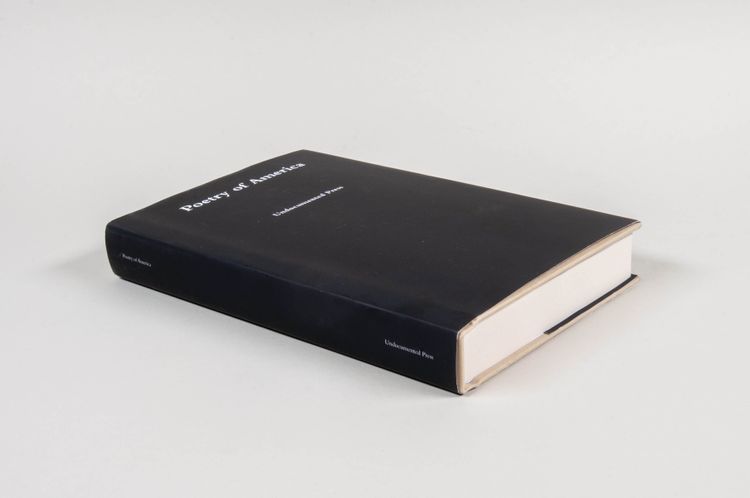Poetry of America is an altered appropriation of William James Linton’s Poetry of America; Selections from One Hundred American Poets from 1776 to 1876. Luca Messarra took a scanned version of Linton’s book, which is fueled by racist and colonialist renderings of language. He then ran the text from the PDF through five languages in Google Translate “in the order of historical colonization of the New World”: from Spanish to Portuguese to French to Dutch to English (blurb on publisher’s website). The resulting text was copied back into the layout of the PDF with Adobe Acrobat Pro.
Thus, Messarra’s book not only has the low quality of visual artifacts typical for Google Books’ scans such as high contrast, pages only partly scanned or showing handwritten marks and other reading traces, as well as Google water marks on every page. It also consists of changing fonts, with single characters sometimes glitching into huge font sizes or interpreting something as a character that was just damaged paper. In this way, Messarra turned Linton’s Poetry of America into a glitched, postcolonial rendering of the original that tries to dispose of the “Anglo-standardization of both language and continent” (blurb on publisher’s website).
This change of perspective is also reflected upon in a quote, inserted by Messarra on the first page, that was not part of Linton’s anthology and is the only deviation apart from the logo of Messarra’s publishing house, Undocumented Press. The quote is from Comentarios Reales de los Incas (1609) by Garcilaso de la Vega, the first published mestizo writer, describing the moment of first contact between indigenes and Spanish colonists from the perspective of an indigenous person with a reflection on the brutal alteration and appropriation of language that already took place during the first words they exchanged.
Poetry for America was conceived during Danny Snelson’s 2018 class “Surveying Poetry Online Today” at University of California, Los Angeles. At that time, Messarra was working at the university’s library where he encountered Linton’s anthology. After his appropriative altering of the book, he replaced the library’s copy of Linton’s book with his version (which also imitates the format and paratext of the original), thus taking away the canonical space the original book physically occupied and changing it into a site for critical engagement with its content.
